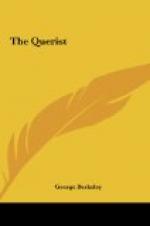218. Qu. Whether the bank projected by Murray, though it partake, in many useful particulars, with that of Amsterdam, yet, as it placeth too great power in the hands of a private society, might not be dangerous to the public?
219. Qu. Whether it be rightly remarked by some that, as banking brings no treasure into the kingdom like trade, private wealth must sink as the bank riseth? And whether whatever causeth industry to flourish and circulate may not be said to increase our treasure?
220. Qu. Whether the ruinous effects of Mississippi, South Sea, and such schemes were not owing to an abuse of paper money or credit, in making it a means for idleness and gaming, instead of a motive and help to industry?
221. Qu. Whether those effects could have happened had there been no stock-jobbing? And whether stock-jobbing could at first have been set on foot, without an imaginary foundation of some improvement to the stock by trade? Whether, therefore, when there are no such prospects, or cheats, or private schemes proposed, the same effects can be justly feared?
222. Qu. Whether by a national bank, be not properly understood a bank, not only established by public authority as the Bank of England, but a bank in the hands of the public, wherein there are no shares: whereof the public alone is proprietor, and reaps all the benefit?
223. Qu. Whether, having considered the conveniencies of banking and paper-credit in some countries, and the inconveniencies thereof in others, we may not contrive to adopt the former, and avoid the latter?
224. Qu. Whether great evils, to which other schemes are liable, may not be prevented, by excluding the managers of the bank from a share in the legislature?
225. Qu. Whether the rise of the bank of Amsterdam was not purely casual, for the security and dispatch of payments? And whether the good effects thereof, in supplying the place of coin, and promoting a ready circulation of industry and commerce may not be a lesson to us, to do that by design which others fell upon by chance?
226. Qu. Whether the bank proposed to be established in Ireland, under the notion of a national bank, by the voluntary subscription of three hundred thousand pounds, to pay off the national debt, the interest of which sum to be paid the subscribers, subject to certain terms of redemption, be not in reality a private bank, as those of England and Scotland, which are national only in name, being in the hands of particular persons, and making dividends on the money paid in by subscribers? [Footnote: See a Proposal for the Relief of Ireland, &c. Printed in Dublin A. D. 1734]
227. Qu. Whether plenty of small cash be not absolutely necessary for keeping up a circulation among the people; that is, whether copper be not more necessary than gold?
228. Qu. Whether it is not worth while to reflect on the expedients made use of by other nations, paper-money, bank-notes, public funds, and credit in all its shapes, to examine what hath been done and devised to add to our own animadversions, and upon the whole offer such hints as seem not unworthy the attention of the public?




